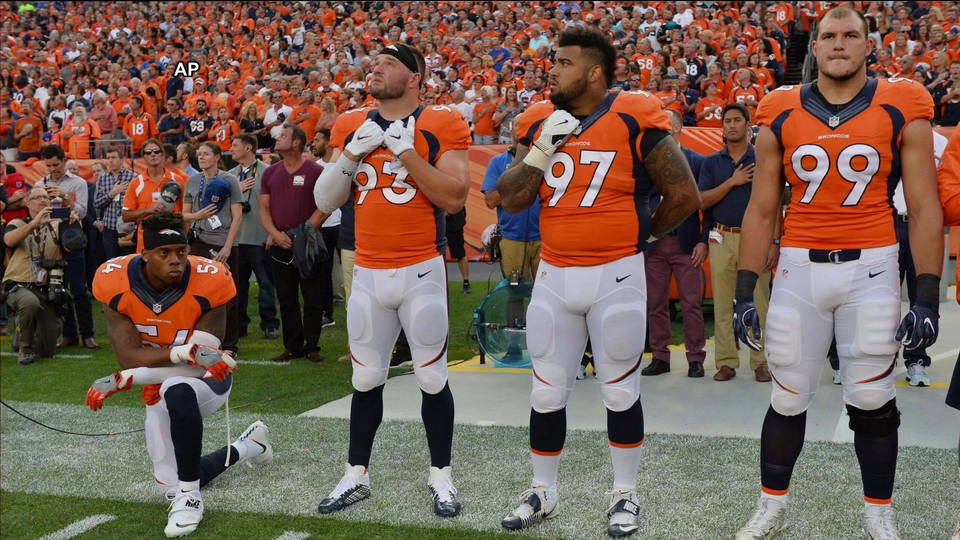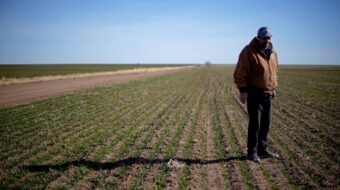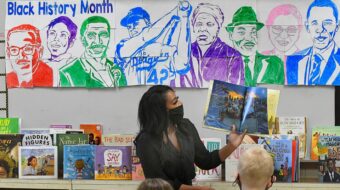
WASHINGTON (PAI) — It’s not just Colin Kaepernick anymore.
From San Francisco to Texas to Alabama, from the pros to colleges to high schools – and even to high school bands – the movement of African-American athletes, notably football players, speaking out and planning further activism on the issue of relations between the police and African-Americans is spreading.
And the NFL players, with the support of their union, are taking the lead, a panel of NFL Players Association General Counsel Joe Briggs, AFL-CIO Civil, Human and Women’s Rights Director Carmen Berkley and veteran Baltimore Ravens tight end Benjamin Watson told a standing-room-only crowd at the AFL-CIO on Oct. 25.
Across the league, players are holding closed-door meetings within their own teams and communicating across team lines about different experiences of African Americans and whites in the U.S., especially in the criminal justice system, and how to publicize their concerns. “There are hundreds of players on conference calls about what we can do next,” Watson said.
That experience is vastly different, something white America is in general unaware of, despite the high-profile police shootings of unarmed African Americans. The American Values Survey, released earlier the same day by The Brookings Institution, showed 80 percent of Republicans believe police treat the races equally, compared to 32 percent of Democrats – and only 19 percent of African Americans.
The shootings prompted Kaepernick, the San Francisco 49ers quarterback, to show his concern by dropping to one knee during the playing of the Star Spangled Banner. Other athletes, and even the band at an Oakland, Calif., high school, have followed suit.
Reactions have varied, the panelists reported. Briggs said “someone at 345 Park Avenue,” the league headquarters in New York City, “had the good sense” to advise NFL Commissioner Roger Goodell not to discipline the players or otherwise comment. Republicans such as presidential nominee Donald Trump and Texas Sen. Ted Cruz denounced the players. So did supermodel Kate Upton, niece of a Michigan Republican congressman.
But the most-outspoken reaction has come from groups of hostile fans, who just want the players to “shut up and play,” as if they lacked the rights of all U.S. citizens to speak out.
That hasn’t stopped the NFL players, 70 percent of whom are African-American.
“The first question I had” after Kaepernick’s kneel-down “was ‘Why did he do it?’” Watson, author of Under Our Skin a book on race relations and athletics, said. “He said ‘I did it because I want the country to be better,’” by confronting the issue of police-African American relations.
“So I identified with him 100 percent.”
So did the rest of the Ravens, who represent a city that was the site of one of the most-notorious deaths, of Freddie Gray, at police hands.
The team started holding players-only meetings to discuss the issue and vent their feelings about it behind closed doors. That’s especially important, said both Watson and Briggs, a former player, because regardless of race, players bond in the locker room over the shared goals of improving and winning.
Other teams, in the NFL, the National Basketball Association – whose players are also majority African-American – and in colleges are holding similar meetings, and reaching across team lines to plan joint action and ways to speak out about the issue, panelists said.
And the leaders of sports player unions in the NFL, NBA, hockey and major league baseball “are in communication with each other” about the issue, too, Briggs said.
The movement has even spread to retired athletes, said former college and pro basketball star Len Elmore, now an attorney and head of the NBA retired players’ association. He noted current athletes, unlike his generation, “have access to the media” – social media – and to lucrative sponsorships.
“By having the conversations right now, while they’re still playing, you can continue the conversations afterwards,” Briggs told Elmore. Some athletes who spoke out lost sponsors, another panelist replied. But other players are such commercial draws that sponsors will think twice before yanking dollars.
The one place the movement has yet to spread is open demonstrations, like Kaepernick’s, among white players. Behind closed doors, there’s a lot of white support, though.
Like bosses in other workplaces, some football coaches have taken hard lines against their players’ views. Others, like one high school coach in Texas, gathered his players behind closed doors to listen to them talk about their experiences with police and gain insight. Like Goodell, the NFL owners have been mostly quiet about the issue.
“Shut up and play,” Berkley said, is virtually identical to what bosses do to workers at all jobs, including in organized sports. On the job, the phrase is “shut up and do your job, or shut up and pick up the trash.”
“We’ve seen some fans stand up for social justice and others say terrible things to us,” Watson said. The fans’ best role, he added, is “to check each other” and objectors – “that it’s inappropriate. And we want to find ways to engage with you.”
A union contract, such as the one the NFL players have with the league means “we are protected at work, so we don’t have to shut up and play,” Berkley declared. “We say to everyone ‘Stand up and activate yourself’ as opposed to ‘shut up and play.’”
Editors’ note: A full broadcast of the event, which was moderated by Nation sports correspondent Dave Zirin, can be found here.












Comments